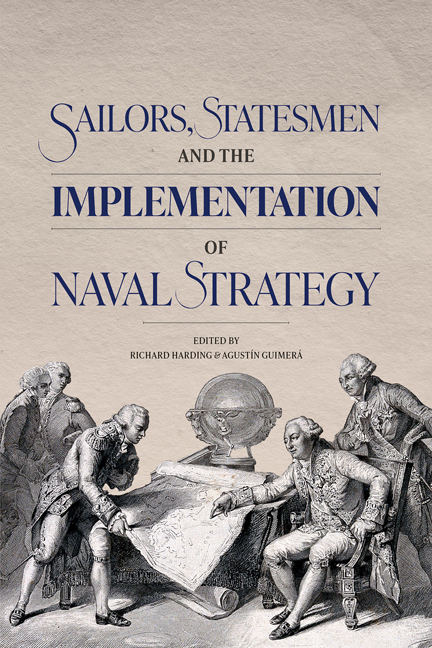Book contents
- Frontmatter
- Dedication
- Contents
- List of Contributors
- Introduction: Naval Leadership: Expertise and Strategy
- 1 The Evolution of French Naval Leadership: Defining the Admiralty of France from the Sixteenth to the Eighteenth Century
- 2 The Makers of Spanish Naval Strategy in the Eighteenth Century: Strategy, Tactics, and Shipbuilding Policy
- 3 Naval Strategic Leadership in Britain, 1739–1748: Political Leaders and Professional Knowledge
- 4 The Statesman and the Naval Leader: The Count of Floridablanca and Navy Minister Antonio Valdés, 1783–1792
- 5 Defining French Eighteenth-Century Naval Strategy
- 6 Casto Méndez Núñez: The Admiral who could have been Regent, 1861–1868
- 7 Teaching by Example: Julian Corbett’s The Campaign of Trafalgar of 1910
- 8 Spanish Naval Leadership during the Second Republic: José Giral Pereira
- 9 The Quest to Understand Naval Leadership: Educating Admirals for High Command in the U.S. Navy from the Eighteenth Century into the Twenty-first Century
- 10 Reflections
- Bibliography
- Index
5 - Defining French Eighteenth-Century Naval Strategy
Published online by Cambridge University Press: 08 May 2024
- Frontmatter
- Dedication
- Contents
- List of Contributors
- Introduction: Naval Leadership: Expertise and Strategy
- 1 The Evolution of French Naval Leadership: Defining the Admiralty of France from the Sixteenth to the Eighteenth Century
- 2 The Makers of Spanish Naval Strategy in the Eighteenth Century: Strategy, Tactics, and Shipbuilding Policy
- 3 Naval Strategic Leadership in Britain, 1739–1748: Political Leaders and Professional Knowledge
- 4 The Statesman and the Naval Leader: The Count of Floridablanca and Navy Minister Antonio Valdés, 1783–1792
- 5 Defining French Eighteenth-Century Naval Strategy
- 6 Casto Méndez Núñez: The Admiral who could have been Regent, 1861–1868
- 7 Teaching by Example: Julian Corbett’s The Campaign of Trafalgar of 1910
- 8 Spanish Naval Leadership during the Second Republic: José Giral Pereira
- 9 The Quest to Understand Naval Leadership: Educating Admirals for High Command in the U.S. Navy from the Eighteenth Century into the Twenty-first Century
- 10 Reflections
- Bibliography
- Index
Summary
If the word ‘strategy’ is now essential for us, it was however absent from French vocabulary of the eighteenth century. At that time no theorist of naval war considered anything than ‘tactics’, that is to say ‘the art to arrange the Navies in the order which is appropriate for the object that one proposes & to regulate their movements’. It meant a science of naval evolutions, or, in other words, operations, which a squadron could carry out. This science is the general officer's one, but, reading the French theorists, from the P. Hoste to the vicomte de Grenier via Bigot de Morogues, it is clear that its subject was not yet a ‘universal science of the war’ including the art of preparing a plan of campaign. That was the task, not of the seaman, but was the monopoly of the king and some of his ministers. On the other hand, the vocabulary then of use in France strained to catch a reality of this. Although the neologism ‘la stratégique’ appears in 1771 from the quill of the Lieutenant-Colonel Joly de Maizeroy, the erudite translator of Byzantine military writings, and it was useful to name such a science which forms and prepares the projects before directing them, the word, nonetheless, remained rare and was not yet applied to the sea.
To this first linguistic difficulty is added a second, related to the frequent absence of sources in archives on the discussions and the methods of decision making by the king in his council. Generally, the design of a plan of operation remains opaque to us. Only the orders given as a result are directly known; all the former stages remaining a state secret. At most we can guess that the development of a plan of campaign was conditioned by political objectives of the Bourbon monarch, by the theoretical structure of the naval forces, fixed on different occasions during the century, and by the concrete constraints amongst units available or likely to be so a few months later. Everyone always expected a short war, such as only one campaign at sea, of a few months, would be enough to confirm the decision.
- Type
- Chapter
- Information
- Sailors, Statesmen and the Implementation of Naval Strategy , pp. 92 - 103Publisher: Boydell & BrewerPrint publication year: 2024



